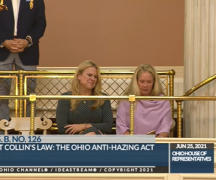By DAVID DUPONT
BG Independent News
Gov. Mike DeWine signed Collin’s Law, a bill making hazing a felony and requiring college officials to report any instances on their campuses. The law passed the Ohio House and Senate unanimously.
That’s a big step forward, said an attorney who represents victims of hazing including the family of Collin Wiant, for whom the bill was named, and Stone Foltz, a BGSU sophomore who died from alcohol poisoning as a result of allegedly being hazed.
In an interview, Rex Elliott, of the law firm Cooper Elliott, said: “Where I think this will have a big difference is parents and college students will now understand that there are severe consequences for hazing.”
Also, “mandatory reporting is now the law of the land. If you see it, you observe it, you report it or you will get charge with a crime.”
The law, though, is not enough. “Universities have to adopt principles and policies that take things further,” he said. “They have to start cracking down on hazing.”
The law firm is working with Bowling Green State University and the Inter-University Council on zero-tolerance policies.
“Colleges and universities have to adopt zero tolerance, one-strike-and-you’re-out policies,” he said. “Otherwise we’re going to see what no one wants to see which is a bunch of 18- to 20-year-old kids in handcuffs and orange jumpsuits.”
That applies not just to the individual students but to the Greek organizations themselves. If they want to be on campus presenting a positive image and engaging in philanthropy then they have to end hazing, or they will be “gone forever.”
“That’s the only way we’re going to eliminate hazing from the culture of these college campuses.”
If this can’t be accomplish then fraternities and sororities may have to be abolished. “It’s up to them.”
The law establishes two layers of hazing. Even the lesser acts – having a pledge do their laundry or fetch their food – will now be higher level misdemeanors and could carry jail time.
“That’s a good thing,” Elliott said. “In my experience in doing these cases for decades, those small acts of hazing are what lead to big acts. We need to stop it altogether.”
Humiliating someone physically or emotionally doesn’t develop closer bonds among people, he said. There are other ways of doing that.
Elliott said he was not concerned that cracking down on hazing would drive the groups off-campus because 18-20 year-olds are not going to be able to pull together the curriculum and structure without the guidance of the national organizations.
“I don’t think it will drive it underground, and for the few that it does there will be severe consequences that will follow them for the rest of their lives,” Elliott said.
Universities have to act quickly to get these policies in place. Students have been “pent up” for a year, and once they return these policies need to be in place or “look out.”
If the Inter-University Council that represents the 14 state university campuses adopts zero tolerance policies, all other colleges in the state will follow suit, he said.
That would make Ohio unique in the nation and could encourage students to come to school here because their parents don’t dread getting a call in the middle of the night informing them that their child has died in a hazing incident.
The cases against those involved in the Pi Kappa Alpha event that resulted in the death of Foltz are facing both civil and criminal proceedings.
The family has filed a civil suit and members of the fraternity are facing criminal charges in Wood County Common Pleas Court.
“We have full faith in the Wood County prosecutor and the judge assigned to the case to case,” Elliott said. “There will be accountability.”





